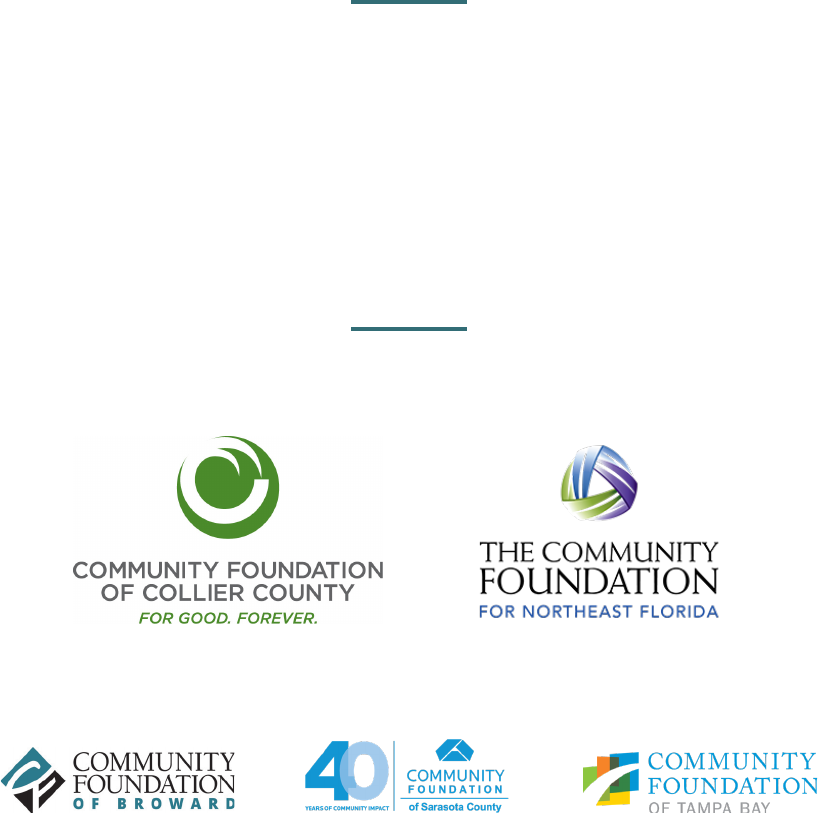
1
www.nonprots.org 6/1/20
LEGAL COMPLIANCE
CHECKLIST
FLORIDA PUBLIC CHARITY

2
www.nonprots.org 6/1/20
to the following partners for making this report possible:
THANK YOU
The Florida Nonprot Alliance informs, promotes, and strengthens the
nonprot sector in order to create more vibrant communities across the state.
MISSION

3
www.nonprots.org 6/1/20
This legal compliance checklist was created by the Florida Nonprot Alliance. It outlines laws applicable to
Florida nonprots regarding their governance, advocacy, human resources, and fundraising. This checkist is not
intended to give legal advice and before relying on any of the contents herein the nonprot should consult with
an attorney. The checklist is intended as a compliance tool for Florida nonprots classied as public charities
under Internal Revenue Code Section 501(c)(3). In order to be classied as a public charity under IRC Section
501(c)(3), a nonprot generally must be a church, hospital, qualied medical research organization afliated with
hospitals, schools, colleges and universities or must meet one of the public support tests provided for under the
IRC. Florida nonprots that are not classied as public charities under IRC Section 501(c)(3) may be subject to
different rules and regulations and should not rely on this checklist as a compliance tool.
What is the public support test for a public charity?
A new section 501(c)(3) organization will be classied as a public charity, and not a private foundation, during its
rst ve years if it can show when it applies for tax-exempt status that it can reasonably expect to be publicly
supported. The IRS will then monitor a new organization’s public charity status after the rst ve years of
existence based on the public support information reported annually by the organization on Schedule A of Form
990 based on a ve-year computation period that includes the current year and the four prior years. Beginning
with the organization’s sixth year and for all succeeding years, if an organization meets the public support test
on Schedule A, the organization qualies as a public charity for its current year and the next tax year. If a
publicly supported charity fails the public support test for two consecutive years, it will be reclassied as a
private foundation and will be subject to different rules and regulations.
There are two public support tests for public charities: One for organizations described in sections 509(a)(1) and
170(b)(1)(A)(vi) of the Internal Revenue Code, and one for organizations described in section 509(a)(2). Both
tests measure public support over a ve-year period.
Generally, the 509(a)(1) test requires that the organization receive at least one-third of its support from
contributions from the general public, or meet the 10 percent facts and circumstances test.
Generally, the 509(a)(2) test requires that the organization receive more than one-third of its support from
contributions from the general public and/or from gross receipts from activities related to its tax-exempt
purposes. Under the 509(a)(2) test, an organization can receive no more than one-third of its support from gross
investment income and unrelated business taxable income.
Have you Who has to do it How and when to do it
Filed Articles of
Incorporation and
held initial board
meeting to adopt
Bylaws and related
governance
policies?
• All FL public charities must le Articles of
Incorporation with the FL Department of State.
• File with the Florida Department of State Division of
Corporations https://dos.myorida.com/sunbiz/
start-business/ele/-nonprot-corporation/
• Adopt bylaws and related governance policies at your
initial board meeting.
• Florida public charities are required to have a minimum
of three board members.
• Florida nonprot corporations statute can viewed here.
http://www.leg.state..us/statutes/index.cfm?App_
mode=Display_Statute&URL=0600-0699/0617/0617.
html

4
www.nonprots.org 6/1/20
Filed Annual Report? • All FL public charities must le an annual report
with the FL Department of State.
• Each year following the year in which a FL public
charity was formed the public charity must le an
annual report with the FL Department of State by
May 1.
Filed IRS Form 1023
to apply for federal
corporate tax
exemption and
made it available
to the public?
• All public charities with gross receipts of $5,000
or more that would like to receive tax-deductible
grants or contributions.
• Generally, organizations with annual gross
receipts of $50,000 or less and total assets
of $250,000 or less may le the online Form
1023-EZ.
• File within 27 months of incorporation for retroactive
recognition of tax exemption to date of incorporation.
• As of January 31, 2020, the IRS requires that Form
1023 be completed and submitted online through
Pay.gov. Applicants are required to have a Pay.gov
account and payment of the user fee must be made
electronically.
• Make your form available for review by anyone who
requests it.
Filed Form 990,
990-EZ, or 990-N
(e-Postcard) and
made your forms for
the past three years
publicly available?
• Public charities with $50,000 or less in annual
gross receipts may use the online Form 990-N
(e-Postcard). Public charities who are not
required to le Form 1023 because they have
gross receipts under $5,000 will still need to ll
Form 990-N.
• Public charities with annual gross receipts of
more than $50,000 or with an average of more
than $50,000 over the past three years must le
Form 990 or Form 990-EZ.
• Public charities with annual gross receipts under
$200,000 and total assets under $500,000 may
le Form 990-EZ.
• All supporting or controlling organizations must
le Form 990 or 990-EZ.
• For scal years beginning on or after July 2, 2019
most public charities are required to le Form 990
or 990-EZ electronically.
• Public charities that fail to le their Form 990,
990-EZ or 990-N for three consecutive years will
automatically lose their tax-exempt status.
However, the IRS is required to provide notice of
the possibility of this revocation to organizations
that have failed to le for two consecutive years.
• Churches, their integrated auxiliaries, and
conventions or associations do not have to le.
• The form is due each year by the 15th day of the 5th
month following the end of your scal year (e.g. May
15 of your scal year ends Dec. 31 or Nov. 15 if your
scal year ends June 30).
• For information on which form to le, see https://www.
irs.gov/charities-non-prots/form-990-series-which-
forms-do-exempt-organizations-le-ling-phase-in
• You must make your applicable Form 990s available
for review by anyone who requests them. You must
provide immediately for in-person requests or within
30 days in the case of written requests. You may
charge a reasonable copying fee plus actual postage,
if any.
• The IRS customer service line for tax exempt entities is
877-829-5500 (Note that the line is currently
unavailable due to COVID-19). Also, you should
consult with your CPA for more details on Form 990
Adopted and
adhere to policies to
policies of interest,
gift acceptance,
Form 990 review,
whistleblower
protection and
document retention
and destruction?
• Most public charities
• On Part VI of Form 990, public charities may be
required to indicate whether they have each of
these policies in place.
• On Part VI of Form 990, public charities are also
asked whether its ofcers, directors, trustees, and
key employees are required to disclose annually
interests that could give rise to conicts.
• See FNA Document Retention Policy Page:
https://nonprots.org/page/RecordRetention
• See National Council of Nonprots Sample whistle
blower policy: https://www.councilofnonprots.org/
sites/default/les/Sample%20WhistleblowerPolicy%20
2.2010.pdf
• See National Council of Nonprot’s Sample conict of
interest policy: https://www.councilofnonprots.org/
tools-resources/conicts-of-interest
• See National Council of Nonprot’s Sample gift
acceptance policy: https://www.councilofnonprots.
org/tools-resources/gift-acceptance-policies

5
www.nonprots.org 6/1/20
Used comparability
data to determine
executive
compensation?
• Public charities with paid employees
• Form 990 requires public charities to indicate
whether they used comparability data to
determine salaries and benets.
• See FNA’s compensation survey as a guide:
https://nonprots.org/page/CompensationSurvey
Reported and paid
tax on Unrelated
Business Income
(UBIT) and made your
Form 990-T for the
past three years
publicly available?
• Any public charity with unrelated business income
of $1,000 or more.
• For more information, see IRS Publication 598,
Tax on Unrelated Business Income of Exempt
Organization. www.irs.gov/pub/irs-pdf/p598.pdf
• A public charity that has unrelated trade or
business income for federal tax purposes is
subject to Florida corporate income tax.
• File IRS Form 990-T (www.irs.gov/forms-pubs/about-
form-990-t) each year by the 15th day of the 5th
month after your scal year ends (e.g. May 15 of
your scal year ends Dec. 31 or Nov. 15 if your scal
year ends June 30).
• A public charity is required to le a Florida Corporate
Income/Franchise Tax Return (Form F-1120) only
when the public charity has “unrelated business
income or is ling Form 990-T with the IRS. or
idarevenue.com/taxes/businesses/Pages/nonprot.
aspx
Are you nonpartisan? • All 501(c)(3) public charities are prohibited from
supporting or opposing candidates for ofce or
political parties.
• Ensure that your board members and staff
understand that they shall not suggest or imply that
they are acting on behalf of the public charity when
engaging in any personal political activities.
Elect 501(h) status
to establish clear
lobbying limits?
• A public charity that will engage in lobbying can
choose to elect 501(h) status. Under Section
501(h), public charities may use up to 20% of the
rst $500,000 of its exempt purpose expenditures
for direct lobbying.
• Public charities that do not take the 501(h)
election must be prepared to demonstrate that
lobbying is an “insubstantial” part of its activities.
• Complete IRS Form 5768 to elect 501(h) status for
the current year and subsequent years. Once
elected, the election will remain in place until
revoked. www.irs.gov/pub/irs-pdf/f5768.pdf
• For additional information, see www.councilofnon
prots.org/taking-the-501h-election
• For additional information, join FNA’s advocacy
101 training. Visit https://nonprots.org/events/
event_list.asp?
Provided donors
with letters of
acknowledgement for
“quid pro quo” gifts of
$75 or more and all
gifts of $250 or more?
• Every public charity that provides goods or
services to donors in exchange for contributions
above $75, must disclose the value of the goods
and services received by the donor, and only
the amount contributed in excess of this value is
tax-deductible to the donor.
• See IRS Publication 1771 (www.irs.gov/pub/irs-pdf/
p1771.pdf) for gift acknowledgement guidelines.
• Donors are responsible for obtaining written gift
acknowledgement for contributions of $250 or
more, but it is considered a best practice for public
charities to send timely gift acknowledgements to
donors for all contributions.
• See National Council of Nonprot’s Sample gift
acknowledgement policy: https://www.councilofnon
prots.org/tools-resources/saying-thank-you-to-
donors
Applied for the
Florida charitable
solicitation license,
renewed it each year,
and included the
required disclosure
statement on your
fundraising materials?
• Prior to soliciting contributions Florida requires
that the public charity register with the Florida
Department of Agriculture and Consumer
Services (FDACS).
• Charitable organizations and fundraisers that
solicit contributions are prohibited from
commingling charitable contributions with
noncharitable funds. This means that
contributions should be kept in a separate
account from funds that are not used for a
charitable purpose. Additionally, charitable
organizations and fundraisers are required to
keep documents to show how contributions are
used.
• You may register online using a link provided on the
FDACS website https://www.fdacs.gov/Busi
ness-Services/Solicitation-of-Contributions
• You may also nd a copy of the registration
application here https://forms.freshfromorida.
com/10100.pdf
• This registration is annual and must be renewed
yearly. If your public charity receives more than
$1,000,000 in contributions in a given year, your
nancials must be audited by a CPA.

6
www.nonprots.org 6/1/20
Checked into the
compliance for
fundraising solicitation
for state from which
you receive donations?
• 41 states require solicitation and public charities
must register in states from which they receive
donations
• Visit the National Association of State Charity
Ofcials website for more information: https://www.
nasconet.org/resources/state-government/
• If you will solicit contributions in other states, you
will need to check the requirements for those states.
For additional information, see www.councilofnon
prots.org/tools-resources/charitable-solicita
tion-registration
Conrmed that any
contract fundraisers
or fundraising
consultants are
licensed?
• Any public charity that will use a contractor to
solicit contributions or advise or assist in
fundraising activities.
• Florida requires that all “professional fundraising
consultants” and “professional solicitors” be
registered prior to engaging in fundraising activities
for a public charity.
• A “professional fundraising consultant” is a person
who is retained by a charitable organization or
sponsor for a xed fee or rate under a written
agreement to plan, manage, conduct, carry on,
advise, consult, or prepare material for a
solicitation of contributions in this state but who
does not solicit contributions or employ, procure, or
engage any compensated person to solicit
contributions and who does not at any time have
custody or control of contributions.
Applied for exemption
from Florida sales and
use tax?
• Florida law grants certain public charities
specic exemptions from Florida sales and use
tax. In order to receive this exemption your public
charity must obtain a Florida Consumer’s
Certicate of Exemption for the Florida
Department of Revenue.
• Renewal Process: At the end of the ve-year
period, the Department will use available
information to determine whether your nonprot
organization or governmental entity is actively
engaged in an exempt endeavor. When the
Department is able to determine that your
nonprot organization or governmental entity
continues to be actively engaged in an exempt
endeavor using available information, a new
Consumer’s Certicate of Exemption will be
issued. When the Department is unable to make a
determination based on the available information,
a letter requesting the documentation listed in
“How to Establish Qualication” for the
appropriate exemption category will be mailed to
you. If you fail to respond to the written requests,
your certicate will expire and will not be
renewed.
• Submit a completed Application for a Consumer’s
Certicate of Exemption Form DR-5 with the FL
Department of Revenue. For more information, see
https://oridarevenue.com/taxes/businesses/Pag
es/nonprot_sales_tax.aspx
Correctly classify
all employees and
independent
contractors?
• Any public charity which has paid employees,
consultants, or contractors. The U.S. Department
of Labor, IRS, and FL Department of Revenue may
impose penalties if a public charity improperly
classies someone as an independent contractor
when they are an employee.
• The IRS provides specic criteria for classifying
employees and contractors. See IRS Publication
1779 www.irs.gov/pub/irs-pdf/p1779.pdf
• The U.S. Department of Labor has also established
a fact sheet detailing which factors employers
should consider when classifying workers as
employees or independent contractors. www.dol.
gov/sites/dolgov/les/WHD/legacy/les/whdfs13.
pdf

7
www.nonprots.org 6/1/20
Correctly classify all
employees as either
exempt or non-exempt
from the Fair Labor
Standards Act (FLSA)
and paid overtime
where appropriate?
• Any public charity with paid employees. • Employees are exempt from the overtime pay
requirements of FLSA if they meet all the following:
(1) paid at least the minimum salary level; (2) paid
on a salary basis; and (3) exercise job duties that are
classied as exempt. The minimum salary threshold
is $35,568 per year ($684 per week). Highly
compensated employees with salaries of $107,432
or more are also exempt from overtime pay
requirements if they regularly perform some of the
job duties of executive, administrative, or
professional employees.
• An employee’s status may change at any time during
the year.
• Non-exempt staff must receive 1.5 times their usual
hourly rate for any time they work in excess of 40
hours in a week.
• For more information see the U.S. Department of
Labor Fact sheet: www.dol.gov/sites/dolgov/les/
WHD/legacy/les/fs17a_overview.pdf
Followed all state and
federal employment
laws including: ling
I-9, W-2, and W-4
forms; withholding tax;
employment tax?
• Any public charity with paid employees.
• The public charity must pay Social Security and
Medicare taxes for all employees.
• For information on withholding and federal
employment taxes, see www.irs.gov/chari
ties-non-prots/employment-taxes-for-exempt-orga
nizations
• For information on Form I-9, see www.uscis.gov/i-9
Determined if you
are liable for FL
reemployment tax?
• A public charity is liable for reemployment tax if
it employs four or more workers for any portion
of a day in 20 different calendar weeks during the
current or preceding calendar year.
• Churches and schools are exempt from this
reemployment tax liability.
• A Florida Business Tax Application (DR-1) must be
completed to provide necessary information to
determine if the public charity is liable for
reemployment tax. (oridarevenue.com/taxes/reg
istration)
• For more information, see (https://oridarevenue.
com/taxes/taxesfees/Pages/reemployment.aspx)
Obtained workers’
compensation
insurance?
• Public charities with four or more employees are
required to provide workers compensation
insurance for their employees.
• Contact the Florida Division of Workers’
Compensation at (850) 413-1609. https://www.my
oridacfo.com/division/wc/employer/coverage.htm
Properly compensated
your paid interns?
• Public charities may use volunteer interns
provided, that they are unpaid, not provided a
stipend and would not be considered an
employee under the FLSA.
• If a public charity chooses to pay its interns, these
interns may be classied as employees subject to
the minimum wage and overtime pay
requirements under the FLSA. If a public charity
pays an intern stipend below the Florida minimum
wage of $8.56 per hour, it must ensure that the
internship would not be considered employment.
• The U.S. Department of Labor provided a fact sheet
for determining if interns would be considered
employees under the FLSA. www.dol.gov/sites/dol
gov/les/WHD/legacy/les/whdfs71.pdf
• See the National Council of Nonprots’ resource on
nonprot interns at www.councilofnonprots.org/
tools-resources/interns-employee-or-volunteer

8
www.nonprots.org 6/1/20
Created a plan
document for your
employee retirement
plan and electronically
led a Form 5500?
• Public charities which establish a 403(b) plan or
any other retirement plan subject to the
Employment Retirement Income Security Act
(ERISA).
• If your public charity establishes a 403(b) or 401(k)
plan, then you must have a written plan document. It
is advisable to work with the third-party
administrator to establish and administer your plan.
• You must le Form 5500 electronically. The due date
for Form 5500 is seven months after the plan-year
for your plan ends.
• Individuals at your public charity that will be
responsible for signing your Form 5500 need to
register on the Department of Labor’s EFAST2
website. https://www.efast.dol.gov/welcome.html
Provided health
insurance for your
employees?
• A public charity which has 50 or more full-time
employees, including full-time equivalents, on
average for the prior year is considered a large
employer under the Affordable Care Act and is
required to offer health insurance coverage to its
employees.
• Public charities that are not considered large
employers have the option to offer health
coverage for their employees.
• Public charities that are considered large employers
and therefore required to offer health insurance to
its employees, must le Form 1095-C and 1094-C
with the IRS. For additional information, see www.
irs.gov/affordable-care-act/employers/affordable-
care-act-tax-provisions-for-large-employers
• Public charities that are not classied as large
employers under the Affordable Care Act have the
option of offering health coverage to their
employees. For additional information on healthcare
options for small public charities, see www.health
care.gov/small-businesses/
Adhered to state laws
for drawing by chance?
• Any public charity that offers a rafe or drawing
by chance as a fundraising event.
• The public charity must make sure that all brochures,
advertisements, notices, tickets, or entry blanks
used in connection with a drawing by chance
conspicuously discloses: 1) the rules governing the
conduct and operation of the drawing; 2) the full
name of the organization and its principal place of
business; 3) the source of the funds used to award
cash prizes or purchase prizes; 4) the date, hour, and
place where the winner will be chosen and the prizes
will be awarded, unless the brochures,
advertisements etc. are not offered to the public
more than 3 days prior to the drawing; and 5) that no
purchase or contribution is necessary.
• If you are offering a rafe of drawing by chance you
may not engage in any of the following: 1) design,
engage in, promote, or conduct any drawing in which
the winner is predetermined by means of matching,
instant win, or preselected sweepstakes or
otherwise or in which the selection of the winners
is in any way rigged; 2) require an entry fee,
donation, substantial consideration, payment, proof
of purchase, or contribution as a condition of
entering the drawing or of being selected to win a
prize. However, this paragraph does not prohibit an
organization from suggesting a minimum donation
or from including a statement of such suggested
minimum donation on any printed material used in
connection with the fundraising event or drawing;
3) condition the drawing on a minimum number of
tickets having been disbursed to contributors or
on a minimum amount of contributions having been
received; 4) arbitrarily remove, disqualify, disallow,
or reject any entry or to discriminate in any
manner between entrants who gave contributions
to the organization and those who did not give such
contributions;

9
www.nonprots.org 6/1/20
5) fail to promptly notify, at the address set forth on
the entry blank, any person whose entry is selected
to win of the fact that he or she won; 6) fail to award
all prizes offered; 7) print, publish, or circulate
literature or advertising material used in connection
with the drawing which is false, deceptive, or
misleading; 8) cancel a drawing; or 9) condition the
acquisition or giveaway of any prize upon the receipt
of voluntary donations or contributions.
Followed the federal
grant and contract
rules under the OMB
Uniform Guidance?
• Public charities with federal grants or contracts,
or state or local grants or contracts which include
federal funds, with effective dates on or after
December 26, 2014.
• Public charities that do not have a federally approved
indirect cost rate may elect to be paid a de minimis
rate of 10% of modied total direct costs.
• Pass through entities, such as state and local
governments are required to recognize this 10% de
minimis rate.
• The OMB Uniform Guidance treats additional costs,
including some program administration costs, as
direct costs.
• The single audit threshold is $750,000.
• The OMB Uniform Guidance requires the use of
consistent, documented procurement processes for
purchases made with federal funds.
• For more information, see www.councilofnonprots.
org/omb-uniform-guidance
Complied with Uniform
Prudent Management
of Institutional Funds
Act (UPMIFA) to
invest and spend from
endowed and other
restricted funds?
• All public charities which hold funds with
donor-imposed restrictions.
• These rules do not apply to funds set aside for
specic purposes by the public charity’s board.
• It is possible for restrictions that apply to funds
created more than 10 years ago which have total
assets less than $100,000 to be released.
• A policy must be adopted which requires the board
to analyze the statutory prudent investing factors
when investing and spending from endowed and
other restricted funds.
• Keep any gift agreements creating endowed and
other restricted funds with your permanent records.
Conrmed that
individuals who will
lobby on your behalf
are registered as a
lobbyist with the
state?
• A person paid to lobby for a public charity must
register as a lobbyist.
• If a public charity has a staff member whose job
is to lobby, then that person must register as a
lobbyist, but there will not be reporting of the
organizations activities because the organization
is not a lobbying rm.
• All lobbyists must register with the Lobbyist
Registration Ofce in the Division of Information
Services of the Ofce of Legislative Services. For
additional information, see www.oridalobbyist.gov/
Filed for a ctitious
name?
• If you will be conducting business under a name
that is different from your public charity’s legal
name, Florida requires you to register this
ctitious name with the Florida Department of
State prior to conducting business under such
ctitious name.
• For more information on registering a ctitious
name, see dos.myorida.com/sunbiz/start-busi
ness/ele/-ctitious-name-registration/
